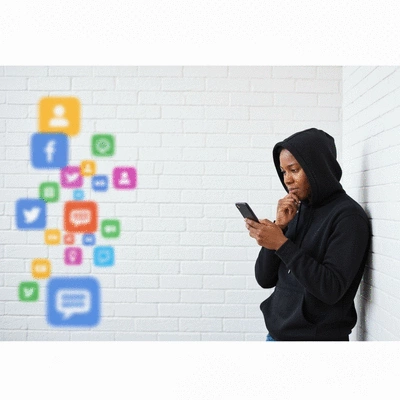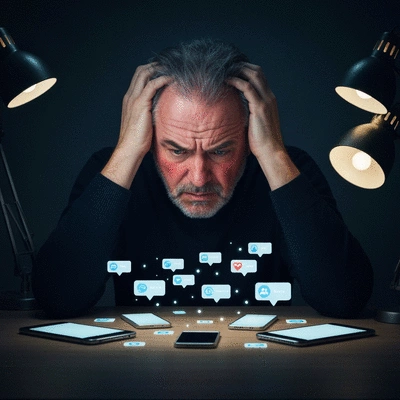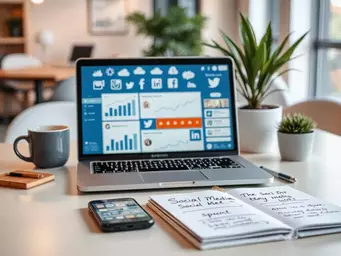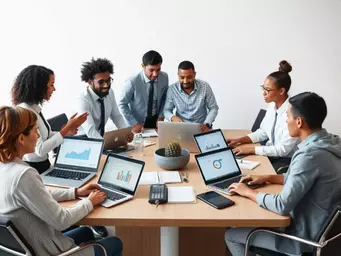
Social Media's Effect on Mental Health
As we navigate the digital landscape, understanding the complex relationship between social media and mental health is crucial. Are we truly connecting, or are we inadvertently isolating ourselves? This exploration will shed light on the impact of our online interactions.
What You Will Learn
- Social media can foster both connection and challenges, significantly impacting mental health.
- Different age groups use social media uniquely, affecting their mental well-being.
- Teens are particularly vulnerable to issues like cyberbullying and pressure from social comparison.
- Online communities can provide vital social support, helping to mitigate feelings of isolation.
- Excessive social media use can lead to anxiety, depression, and a distorted sense of reality.
- Understanding FOMO (Fear of Missing Out) is essential for developing healthier online habits.
- Promoting authentic interactions can enhance our online experiences and improve self-esteem.
Impact of Social Media on Mental Health: Key Dynamics and Vulnerabilities
Dive into the complex relationship between social media and mental well-being, focusing on engagement patterns, content consumption, and the specific vulnerabilities of teenagers, alongside the critical role of social support.
The Relationship Between Social Media and Mental Health
In today's digital age, the intersection of social media and mental health is a crucial topic. At Likers Network, we understand that social media is more than just a platform for sharing photos and updates; it plays a significant role in shaping our emotional well-being. With millions of users worldwide, it's essential to grasp how our online interactions impact our mental health.

So, what exactly is the relationship between social media and mental health? It's complex! While it can foster connection and community, it also presents challenges that can lead to various mental health issues. Let’s dive deeper into this intricate dynamic.
Understanding the Complex Dynamics of Social Media Usage
Social media usage varies widely among individuals, influenced by age, culture, and personal experiences. As a digital strategist, I've seen how different platforms cultivate unique environments. Here's a breakdown of the key dynamics:
- Engagement Patterns: Different age groups interact with social media differently. Young users might seek validation through likes, while older generations may prioritize information sharing.
- Content Consumption: The type of content consumed can shape mental health. Positive interactions can uplift, while negative experiences can lead to feelings of inadequacy.
- Perceived Norms: Social media can create an exaggerated sense of reality. Many users feel pressure to conform to perceived social norms, impacting their self-esteem.
These dynamics highlight the necessity of critically examining how we engage with social media. Are we using it to connect or to compete?
How Social Media Impacts Different Age Groups: A Focus on Teens
Teens are particularly vulnerable to the effects of social media, as their identities are still forming. The constant barrage of curated content can lead to issues like anxiety and low self-esteem. Research indicates that social media use can have a significant impact on youth mental health. Furthermore, studies by the World Health Organization highlight the connection between teens, screens, and mental health challenges, while the American Psychological Association offers a health advisory on adolescent social media use. Consider these points:
- Bullying: Cyberbullying is rampant, affecting around 15% of teens regularly.
- Comparison: About 70% of teens report feeling pressured to look a certain way based on social media influences.
- Validation: Many teens seek validation through likes, which can result in a fragile self-worth tied to online approval.
It's crucial for parents and educators to foster open discussions about social media use among teens. This can help them navigate the pressures and promote a healthier relationship with these platforms.
The Role of Social Support in Mitigating Mental Health Challenges
While social media can introduce challenges, it can also serve as a powerful tool for building social support. At Likers Network, we believe in the importance of connection. Here’s how social support can help:
- Community Building: Online communities can provide a sense of belonging, especially for those feeling isolated.
- Shared Experiences: Users can find solidarity in shared challenges, reducing feelings of loneliness.
- Access to Resources: Many social media platforms promote mental health resources and support groups, making help more accessible.
Encouraging positive interactions on social media can combat feelings of isolation and foster resilience among users. Remember, connection is key!
Pro Tip
To cultivate a healthier relationship with social media, consider setting specific time limits on your usage. This helps reduce feelings of anxiety and promotes a more balanced lifestyle. Additionally, curate your feed to follow accounts that inspire and uplift you, rather than those that evoke comparison and negativity.
Negative Effects of Social Media on Mental Health
As we dive deeper into the negative effects of social media, it's crucial to understand how these platforms can impact our mental health. While social media serves as a tool for connection, it also harbors certain risks that can lead to adverse psychological outcomes. From feelings of inadequacy to cyberbullying, the implications are significant and warrant our attention.
Through my work at Likers Network, I’ve come across numerous discussions about these issues. It’s clear that while social media can foster relationships, it can also create an environment ripe for mental health challenges. So, let's break down some of these negative effects.

Exploring Connections Between Social Media and Depression
Many studies have highlighted a troubling link between social media usage and increased rates of depression. The constant barrage of curated lives can leave users feeling inadequate. Consider the following:
- Exposure to idealized lifestyles creates unrealistic expectations.
- Comparison with peers can foster feelings of unworthiness.
- Excessive use can lead to diminished real-life interactions.
Such behaviors can create a cycle of negative self-talk and emotional distress. It’s essential to recognize these patterns early to address them effectively.
The Rise of Anxiety: Social Media's Role in Mental Health Challenges
Social media doesn’t just connect us; it can also amplify feelings of anxiety. Users often experience a heightened sense of pressure to be constantly engaged. This pressure can manifest in several ways:
- Fear of missing out (FOMO) can lead to anxiety about not participating in social trends.
- Notifications and messages create a sense of urgency that disrupts mental peace.
- Perfectionism in online personas leads to constant stress about maintaining an image.
Recognizing these anxiety triggers is a critical step toward finding healthier social media habits. It's something I address when guiding others through their online journeys.
Cyberbullying: A Growing Concern in the Digital Age
One of the most serious negative impacts of social media is the rise of cyberbullying. Unlike traditional bullying, this form can happen 24/7 and reach a wider audience. It's vital to understand the extent of this issue:
- Victims of cyberbullying often experience depression, anxiety, and low self-esteem.
- Harassment can lead to severe emotional distress and withdrawal from social interactions.
- Online anonymity can embolden bullies, making it harder to combat the behavior.
By fostering awareness around cyberbullying, we can begin to create safe spaces within our digital communities. As someone passionate about digital culture, I can’t stress enough how important this is.
Isolation and Loneliness: The Paradox of Online Connection
It might seem counterintuitive, but social media can actually foster feelings of isolation. While we are more connected than ever, many users report feeling lonely. This paradox is often due to:
- Superficial interactions that lack depth.
- The illusion of connection without genuine relationships.
- Comparisons that lead to feelings of inadequacy and social exclusion.
This highlights an essential aspect of our online lives: connection does not always equal community. It’s imperative to cultivate authentic interactions and seek out deeper relationships.
Understanding FOMO (Fear of Missing Out) and Its Psychological Impact
FOMO has become a pervasive phenomenon in our digital age. Social media platforms amplify this fear, leading to feelings of anxiety and inadequacy. How does FOMO affect us?
- It can drive compulsive checking of social media, leading to decreased productivity.
- Users may feel pressured to attend events or engage in activities for fear of missing out.
- This can lead to overstimulation and burnout from trying to keep up.
Understanding FOMO is the first step toward overcoming it. By recognizing its influence on our behavior, we can begin to prioritize our well-being over the incessant need for digital validation.
The Influence of Social Comparison on Self-Esteem and Body Image
Finally, social comparison plays a significant role in shaping our self-esteem and body image. With so many curated images online, it's easy to fall into the trap of comparing ourselves to others. Key points to consider include:
- Constant exposure to idealized images can distort our self-image.
- This can lead to issues such as body dissatisfaction and unhealthy behaviors.
- Understanding the artificial nature of these portrayals is crucial for self-acceptance.
As we navigate social media, it’s vital to remember that what we see is often not reality. Fostering a healthy self-image starts with recognizing and challenging these comparisons.
Frequently Asked Questions About Social Media and Mental Health
Q1: How does social media affect mental health?
Social media has a complex impact on mental health. While it can foster connection, community, and social support, it can also lead to challenges like anxiety, depression, cyberbullying, social comparison, and feelings of inadequacy or isolation.
Q2: Why are teenagers particularly vulnerable to the negative effects of social media?
Teens are especially vulnerable because their identities are still forming. They are exposed to curated content, which can lead to anxiety and low self-esteem due to cyberbullying, pressure for social comparison, and seeking validation through online approval.
Q3: Can social media be beneficial for mental health?
Yes, social media can be beneficial. It can serve as a powerful tool for building social support, fostering a sense of community, allowing users to find solidarity in shared experiences, and providing access to mental health resources and support groups.
Q4: What is FOMO, and how does it relate to social media?
FOMO, or "Fear of Missing Out," is a pervasive phenomenon amplified by social media. It can lead to anxiety and inadequacy, driving compulsive platform checking, pressure to participate in trends, and overstimulation from trying to keep up with others' online activities.
Q5: How can individuals create a healthier relationship with social media?
To cultivate a healthier relationship, individuals can set specific time limits on usage, curate their feeds to follow uplifting accounts, recognize the artificial nature of idealized online portrayals, and prioritize authentic interactions over superficial connections.
Recap of Key Points
Here is a quick recap of the important points discussed in the article:
- Social media has a complex relationship with mental health, capable of fostering both connection and challenges.
- Different age groups utilize social media in varied ways, influencing their mental well-being.
- Teens are particularly vulnerable to social media pressures such as cyberbullying and unrealistic comparisons.
- Social support through online communities can mitigate mental health issues by providing belonging and shared experiences.
- Negative effects of social media include increased rates of depression, anxiety, and feelings of isolation.
- Recognizing and addressing the influence of FOMO and social comparison is essential for fostering a healthy self-image.






Understanding Dynamics
Social media usage is influenced by age, culture, and personal experiences, creating unique environments.
Teens' Vulnerability
Teens are particularly vulnerable to curated content, leading to anxiety and low self-esteem.
Role of Social Support
Social media can be a powerful tool for building support and mitigating mental health challenges.
Negative Effects Overview
Social media can lead to adverse psychological outcomes despite its role in connection.